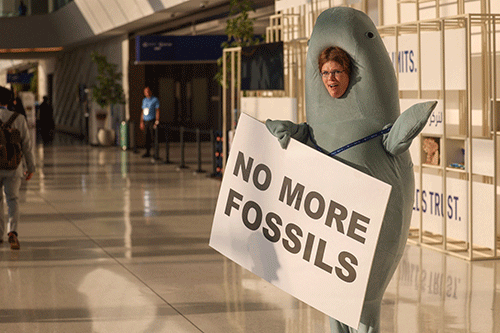PARIS – The COP28 climate talks in Dubai have begun with a flurry of announcements promising action on global warming, led by its big-spending, oil-rich host the United Arab Emirates. But observers have warned that the headline-grabbing pledges could distract from the real battles on fossil fuels, and negotiating a formal COP28 text at the end of the two-week talks.
As pressure builds during what is expected to be the hottest year on record, here are some major funding pledges and declarations announced so far at COP28.
The first day of the talks Thursday saw the launch of a landmark “loss and damage” fund to help vulnerable countries cope with the increasingly costly and damaging impacts of climate disasters.
The UAE and Germany pledged US$100 million each, France US$109 million, US$50 million from Britain, US$25 million from Denmark and US$17.5 million from the United States, the world’s biggest historical polluter. Campaigners said the US offering was woefully inadequate.
The total committed as of Saturday was some US$656 million, according to a tally by the Natural Resources Defence Council, an environmental advocacy group.
That falls vastly short of the US$100 billion a year that developing nations – which have historically been least responsible for greenhouse gas emissions – have said are needed to cover losses from natural disasters.
At least 116 countries committed Saturday to triple renewable energy capacity worldwide by 2030, and double the annual rate of energy efficiency improvements.
G20 nations, which account for nearly 80% of global greenhouse gas emissions, paved the way for a deal when they endorsed the renewable energy goal in September.
While supporters are expected to push for the pledge to be included in the final outcome of the talks, there are fears that the COP28 hosts were willing to shunt the more ambitious targets into voluntary deals.
The US committed to phasing out its existing unabated coal plants as it joined the Powering Past Coal Alliance (PPCA) on Saturday.
Abatement generally means when the emissions from a power plant are captured before going into the atmosphere.
Global CO2 emissions from coal-fired power plants reached a new high in 2022, and the US has the world’s third-biggest capacity behind China and India.
Colombia became one of the largest fossil fuel producers to join the Fossil Fuel Non-Proliferation Treaty Initiative, a movement led by climate vulnerable island nations to end new development of coal, oil and gas.
Meanwhile, 50 oil and gas companies representing 40% of global production also pledged to decarbonise their operations by 2050. But the non-binding agreement does not include emissions when their fuels are burned by customers.
More than 20 countries led by the US called Saturday for the tripling of world nuclear energy capacity by 2050. While nuclear generates almost no greenhouse gases, the Fukushima nuclear disaster in Japan in 2011 dealt it a severe blow.
But experts and activists point to the fact that new nuclear plants can take decades, while renewable energy is rising fast. More than 130 countries have agreed to prioritise food and agriculture systems in their national climate plans.
The non-binding declaration was welcomed by observers, with food systems estimated to be responsible for roughly a third of human-made greenhouse gases.
But some criticised it for lacking concrete goals — and not mentioning fossil fuels or signalling any change to more sustainable diets.
Over 120 countries signed up to a declaration to “place health at the heart of climate action”. It called for governments to step up action on climate-related health impacts like extreme heat, air pollution and infectious diseases.
Almost nine million people a year die from polluted air, while 189 million are exposed to extreme weather-related events.
The declaration notes “the benefits for health from deep, rapid and sustained reductions in greenhouse gas emissions”, but makes no direct reference to the fossil fuels responsible for most human-caused pollution. COP28’s themed day on health was yesterday.
The UAE said it is putting US$30 billion into a new private climate investment fund.
The oil-rich COP28 host said the fund, called Alterra, would partly try to focus on climate projects in the developing world, and hoped to stimulate investments totalling US$250 billion by 2030. – Nampa/AFP


